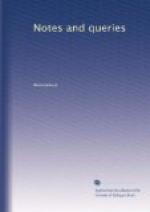“... Dec. 1626, being thursday, Elizabeth Lady Ashbornham widor of S’r Jno Ashbornham, was married in S’t Giles his Church in y’e feildes, nere London, to S’r Thomas Richardson, K’t, then Lo. cheife Justice of y’e common pleas.”
The day of the month is torn out. It would almost seem as if this was the wedding dinner, on the occasion of the marriage of the Chief Justice with Lady Dering’s mother; at all events the reunion of the family in London was caused by that event.
Banquet was the name given to a dessert, and it was usually set out in another room.
The large baking pear is still called warden in many counties.
Appended to the above is a bill of the items of the “banquet,” with the cost of hire for the glass plates; but it is so hopelessly illegible that I will not venture to give it. Many of the items, as far as I can read them, are not to be found in “the books,” and are quite new to me.
Having had no small experience in deciphering hopeless scribblings, I think I may pronounce this to be better left alone than given in its present confused state.
LAMBERT B. LARKING
Ryarsh Vicarage.
* * * * *
MONETA SANCTAE HELENAE.
As a subscriber to your valuable publication, allow me to suggest that it might, from time to time, be open to contributions explaining obscure passages or words, which often occur in the works of mediaeval writers, and more especially in early English records. So far as English usages and customs are concerned, the Glossary of Du Cange is of comparatively little value to the English student; many terms, indeed, being wrongly interpreted in all editions of that work. Take, for example, the word “tricesima,” the explanation of which is truly ridiculous; under “berefellarii,” the commentary is positively comic; and many other instances might be cited. At the same time, it would be presumptuous to speak otherwise than in terms of the highest respect and admiration of Du Cange and his labours. The errors to which I allude were the natural consequences of a foreigner’s imperfect knowledge of English law and English customs; still it is to be lamented that they should have remained uncorrected in the later editions of the Glossary; and I take it to be our duty to collect and publish, where feasible, materials for an English dictionary of mediaeval Latin. It is in your power materially to advance such a work, and under that impression I venture to send the present “Note.”




